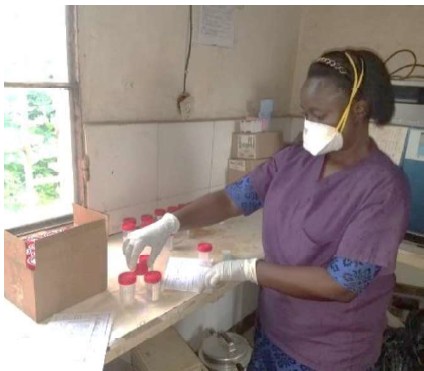- What We Do
- Agriculture and Food Security
- Democracy, Human Rights and Governance
- Economic Growth and Trade
- Education
- Environment and Global Climate Change
- Gender Equality and Women's Empowerment
- Global Health
- Humanitarian Assistance
- Transformation at USAID
- Water and Sanitation
- Working in Crises and Conflict
- U.S. Global Development Lab
Speeches Shim

USAID and provincial authorities test, isolate, and treat for TB infection in a Democratic Republic of Congo prison
“After the campaign and screenings, we learned our [TB] status and adhered to treatment to be completely cured. We also committed to voluntary outreach to other residents,” – TB patient
In Sud-Kivu province, Uvira prison was originally constructed to accommodate a maximum of 150 prisoners. It now houses more than 1,000 in crowded and unsanitary conditions. As a result, the prison has become a breeding ground for infections of Koch bacillus, which causes tuberculosis (TB). Uvira also has one of the highest TB prevalence rates in Sud-Kivu, with cases dating back to 2017.
TB case detection is a challenge in the prison, as detainees tend to fall through the cracks of health zone interventions. Although there is an on-site dispensary, the facility has low stocks of medicines, equipment, and other materials needed to effectively manage the prison’s frequent TB outbreaks.
In January 2020, USAID’s Integrated Health Program (IHP) coordinated with prison authorities and the health zone central office to organize a briefing for community health workers and prison providers. The provincial health division then held an awareness campaign, supported by USAID.
During the campaign, health workers collected 1,000 samples from prison inmates and used fluorescence microscopy to diagnose 19 TB cases. Those with TB were isolated and immediately put on treatment.
Two inmates expressed their gratitude to USAID IHP for giving them the tools and knowledge to fight TB, understand their own health status, protect themselves, and stop transmission.
“After being detained for 19 months, I started to cough a bit, and then the cough became wet and lasted a long time. I didn’t know anything about tuberculosis or how it is transmitted. After my neighbor also started to cough, we thought it was temporary or due to the cold. The disease was already spreading,” one man said.
“We thank USAID IHP for this activity that has revealed the prevalence of TB in the prison and helped us enact sustainable strategies to reduce transmission and maybe even end the disease in the facility,” said Jules Kutunziza, a prison nurse. “We are committed to continuing TB sensitization campaigns, taking samples from prisoners, and analyzing them in collaboration with the technicians at the General Reference Hospital of Uvira.”
USAID IHP also supports the Uvira health zone to train healthcare providers on finding active TB cases, collecting and transporting samples, and supplying medical inputs.

Comment
Make a general inquiry or suggest an improvement.